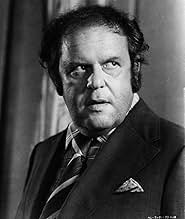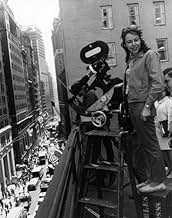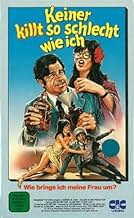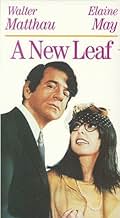VALUTAZIONE IMDb
7,3/10
8251
LA TUA VALUTAZIONE
Henry vive la vita di un playboy. Quando il suo avvocato gli dice che il suo stile di vita ha consumato tutti i suoi fondi, Henry ha intenzione di sposare la ricca scienziata Henrietta Lowel... Leggi tuttoHenry vive la vita di un playboy. Quando il suo avvocato gli dice che il suo stile di vita ha consumato tutti i suoi fondi, Henry ha intenzione di sposare la ricca scienziata Henrietta Lowell e ucciderla.Henry vive la vita di un playboy. Quando il suo avvocato gli dice che il suo stile di vita ha consumato tutti i suoi fondi, Henry ha intenzione di sposare la ricca scienziata Henrietta Lowell e ucciderla.
- Regia
- Sceneggiatura
- Star
- Premi
- 1 vittoria e 3 candidature totali
Conrad Bain
- Professor Heinrich
- (non citato nei titoli originali)
Ida Berlin
- Maid
- (non citato nei titoli originali)
Mildred Clinton
- Mrs. Heinrich
- (non citato nei titoli originali)
Trent Gough
- Victor the Butler
- (non citato nei titoli originali)
Recensioni in evidenza
A New Leaf (1971)
A kookie, forcibly odd movie. If at first you think it's just plain stupid, keep watching. It's really well balanced, smartly written, and acted with more restraint than usual for a madcap movie like this.
It's billed (by some) as filled with dark humor, but it didn't strike me as dark, not like the contemporary "Harold and Maude" for example. But there is an unusual tone achieved here that is just slightly different and worth getting a feel for. There is, for another example, a parallel in general plot and scenario to "How to Murder Your Wife" from 1965, complete with the willing butler and the hapless rich bachelor, but that movie is a silly 1960s farce and this one has an edge of almost poignancy to it. (I write that word and think Elaine May would cringe--only because I don't think there is an intention to be sentimental or even romantic, the last scene notwithstanding.)
The star is singularly Walter Matthau, who is almost necessarily goofy just by appearances. But maybe the first clever trick by the director, Elaine May, is putting the goofy man in even goofier situations so that he comes off as actually someone serious and believable. To have his character, Henry Graham, driving in his red Ferrari wearing a crash helmet is pure insanity, yet you don't blink an eye. The guy is self-absorbed and nuts. But also very likable, a little out of touch the way we all are, or wish we could be (if we had his money).
And of course the man's dilemma is stated immediately: the money he once had so much of is used up. And you have to see to appreciate the one long scene in the first twenty minutes with Graham meeting his financial adviser about some bounced checks. This is comedy at its absolute best--I mean that. Watch only this scene if you must (and I dare you to skip the rest of the movie once you do). The actor opposite Matthau here is William Redfield, who pulls off the most brilliant of performances.
The other leading character, eventually, is Elaine May herself as the clumsy, naive, filthy rich scientist who Graham sets his sights on for salvation. She is terrific, as well, and like Woody Allen of the same time ("Bananas" is also 1971) seems to direct her own comic zaniness with a calculated distance. The rest of the shenanigans play out with the necessary twists, and it's consistently funny.
So, see this for its freshness even four decades later. No wonder it has a (small but growing) cult following. May has suffered historically from having made the bizarrely awkward "Ishtar" and for being forever linked in the early 1960s as the comedy partner of Mike Nichols, whose movie career overshadows almost everyone's. But here, at least, she shines on her own terms, without distraction.
A kookie, forcibly odd movie. If at first you think it's just plain stupid, keep watching. It's really well balanced, smartly written, and acted with more restraint than usual for a madcap movie like this.
It's billed (by some) as filled with dark humor, but it didn't strike me as dark, not like the contemporary "Harold and Maude" for example. But there is an unusual tone achieved here that is just slightly different and worth getting a feel for. There is, for another example, a parallel in general plot and scenario to "How to Murder Your Wife" from 1965, complete with the willing butler and the hapless rich bachelor, but that movie is a silly 1960s farce and this one has an edge of almost poignancy to it. (I write that word and think Elaine May would cringe--only because I don't think there is an intention to be sentimental or even romantic, the last scene notwithstanding.)
The star is singularly Walter Matthau, who is almost necessarily goofy just by appearances. But maybe the first clever trick by the director, Elaine May, is putting the goofy man in even goofier situations so that he comes off as actually someone serious and believable. To have his character, Henry Graham, driving in his red Ferrari wearing a crash helmet is pure insanity, yet you don't blink an eye. The guy is self-absorbed and nuts. But also very likable, a little out of touch the way we all are, or wish we could be (if we had his money).
And of course the man's dilemma is stated immediately: the money he once had so much of is used up. And you have to see to appreciate the one long scene in the first twenty minutes with Graham meeting his financial adviser about some bounced checks. This is comedy at its absolute best--I mean that. Watch only this scene if you must (and I dare you to skip the rest of the movie once you do). The actor opposite Matthau here is William Redfield, who pulls off the most brilliant of performances.
The other leading character, eventually, is Elaine May herself as the clumsy, naive, filthy rich scientist who Graham sets his sights on for salvation. She is terrific, as well, and like Woody Allen of the same time ("Bananas" is also 1971) seems to direct her own comic zaniness with a calculated distance. The rest of the shenanigans play out with the necessary twists, and it's consistently funny.
So, see this for its freshness even four decades later. No wonder it has a (small but growing) cult following. May has suffered historically from having made the bizarrely awkward "Ishtar" and for being forever linked in the early 1960s as the comedy partner of Mike Nichols, whose movie career overshadows almost everyone's. But here, at least, she shines on her own terms, without distraction.
Elaine May has created a many layered comedy that stays with you, if you can connect with it. The paths ones life takes often has many bends. Henry (Matthau) has no idea how many. Born to a life style he can not maintain, he chooses to deal with adversity by ignoring it. Eventually reality shakes him loose, and he must learn to deal with things and give back to society rather than taking from it. Henrietta (May) is his victim and his savior. The epitome of a child who was always sent away, she has grown into a person who is not really there. Her catalyst and transmogrifier is Henry. Haunting dialog and poignant social exposition make this classic 70's sleeper worth every stretch.
One of those films which has no real highlight but which never the less leaves you feeling that you have just really enjoyed the movie. Matthau plays his roll in a way that no other could, making you feel real contempt for his character until at the last fence, he redeems himself completely. Producing and acting in the major supporting role shows the bungling and accident prone Elaine May on top form also. A real forgotten gem that is certainly worth the view.
My room mate and I love this film. We're always quoting lines from it.
"There's carbon on the valves!"
"I've achieved a sort of immortality. As a footnote and under G."
"Henrietta, you have your head in the arm hole!"
I respect Ms. May so much I feel a little guilty enjoying the film she disowned. I hope one day she will, if possible, do a "Touch Of Evil" style re-editing of the film, so that we can enjoy it as she originally intended. I guess you could say that this is my hope and my dream, which is to say that my hope and my dream are the same (my dream.)
"There's carbon on the valves!"
"I've achieved a sort of immortality. As a footnote and under G."
"Henrietta, you have your head in the arm hole!"
I respect Ms. May so much I feel a little guilty enjoying the film she disowned. I hope one day she will, if possible, do a "Touch Of Evil" style re-editing of the film, so that we can enjoy it as she originally intended. I guess you could say that this is my hope and my dream, which is to say that my hope and my dream are the same (my dream.)
Every now and then you stumble across a film that has been forgotten, or just ignored, and for the life of you, you can't figure out why. "A New Leaf" is such a film. Seeing this wonderful comedy for the first time was the movie-watching equivalent of discovering buried treasure.
One of the marks of an excellent comedy is one that you can watch a number of times and still laugh involuntarily even though you know what is coming. The performances of Matthau and May, as well as the supporting cast are that priceless.
So many funny and memorable scenes, but a couple of my favorites are: the meeting between Henry Graham (Matthau) and his accountant Beckett (Redfield) as Beckett tries to contain his frustration and explain to Matthau that his money is gone ("perfect"); and the scene where Graham crawls to his rich uncle (James Coco) to ask to borrow money while the uncle is favoring an electric pepper mill during his lavish meal (the expressions on Matthau's face are exquisite).
A delightful, black romantic comedy that somehow manages to be very light, and as a bonus even subtly tosses out some profound truths.
One of the marks of an excellent comedy is one that you can watch a number of times and still laugh involuntarily even though you know what is coming. The performances of Matthau and May, as well as the supporting cast are that priceless.
So many funny and memorable scenes, but a couple of my favorites are: the meeting between Henry Graham (Matthau) and his accountant Beckett (Redfield) as Beckett tries to contain his frustration and explain to Matthau that his money is gone ("perfect"); and the scene where Graham crawls to his rich uncle (James Coco) to ask to borrow money while the uncle is favoring an electric pepper mill during his lavish meal (the expressions on Matthau's face are exquisite).
A delightful, black romantic comedy that somehow manages to be very light, and as a bonus even subtly tosses out some profound truths.
Lo sapevi?
- QuizThe film as delivered by Elaine May was drastically re-cut and shortened ("butchered", according to some) by Paramount before its release. May sued Paramount after such drastic cuts and attempted to have her name removed from the credits, but was unsuccessful. Sadly, neither the director's cut of the film nor the original shooting script has ever been made publicly available.
- Citazioni
Henry Graham: Excuse me, you're not by any chance related to the Boston Hitlers?
- ConnessioniFeatured in Siskel & Ebert & the Movies: Buried Treasures - 1987 Edition (1987)
I più visti
Accedi per valutare e creare un elenco di titoli salvati per ottenere consigli personalizzati
Dettagli
- Data di uscita
- Paese di origine
- Lingue
- Celebre anche come
- A New Leaf
- Luoghi delle riprese
- Oakland Gardens, Queens, New York, New York, Stati Uniti(Henry drives his Ferrari from the southbound Cross Island Parkway to the eastbound Long Island Expressway)
- Aziende produttrici
- Vedi altri crediti dell’azienda su IMDbPro
Botteghino
- Budget
- 4.000.000 USD (previsto)
- Lordo in tutto il mondo
- 308 USD
Contribuisci a questa pagina
Suggerisci una modifica o aggiungi i contenuti mancanti

Divario superiore
By what name was È ricca, la sposo e l'ammazzo (1971) officially released in India in English?
Rispondi
































